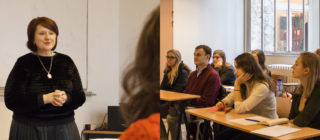Methodology
“The Methodology course helped me be more independent when preparing for assignments and final exams that followed the traditional French formats.”
– Ester Luna, Yale University
Whether students take classes at the CUPA center or at university, learning about French methodology deepens students’ cultural and academic immersion in Paris.
French methodology training is part of the academic support provided by CUPA. The intensive pre-session allows students to master an academic approach that can be quite different from what American students are used to. It encourages students to take their analytical skills a step further and gain more perspective on their learning experience as active participants within the French academic environment. Throughout the semester, students continue to have access to office hours with CUPA’s methodology professors.

Methodology
© CUPA - Silvia SabinoWhy Learn About French Methodology?
Thinking is universal. Ideas, on the other hand, are in large part cultural constructs. In each country, we teach children, and later students, how to think. Family, schools, and universities are spaces where we build and transmit these intellectual traditions that are unique to each culture. These methods that determine how we think and express our ideas are rarely the subject of formal study since their transmission is almost invisible. As a result, students coming from an American academic context are unfamiliar with French university methodology and adapting can be challenging. The methodology program aims to present the various methods of thought that form the foundation of the work expected of university students in France. Throughout the term, students can attend office hours with CUPA faculty should they have any doubts about French methodology.
Objectives of CUPA's Methodology Support
- To learn what French university professors expect of students in regards to specific types of homework, as well as the rules and methods required to meet those expectations
- To explore elements of intellectualism that are unique to the French method
- To learn about the history and reasons behind French methodology
- To compare the differences between the anglo-saxon intellectual tradition and its French counterpart